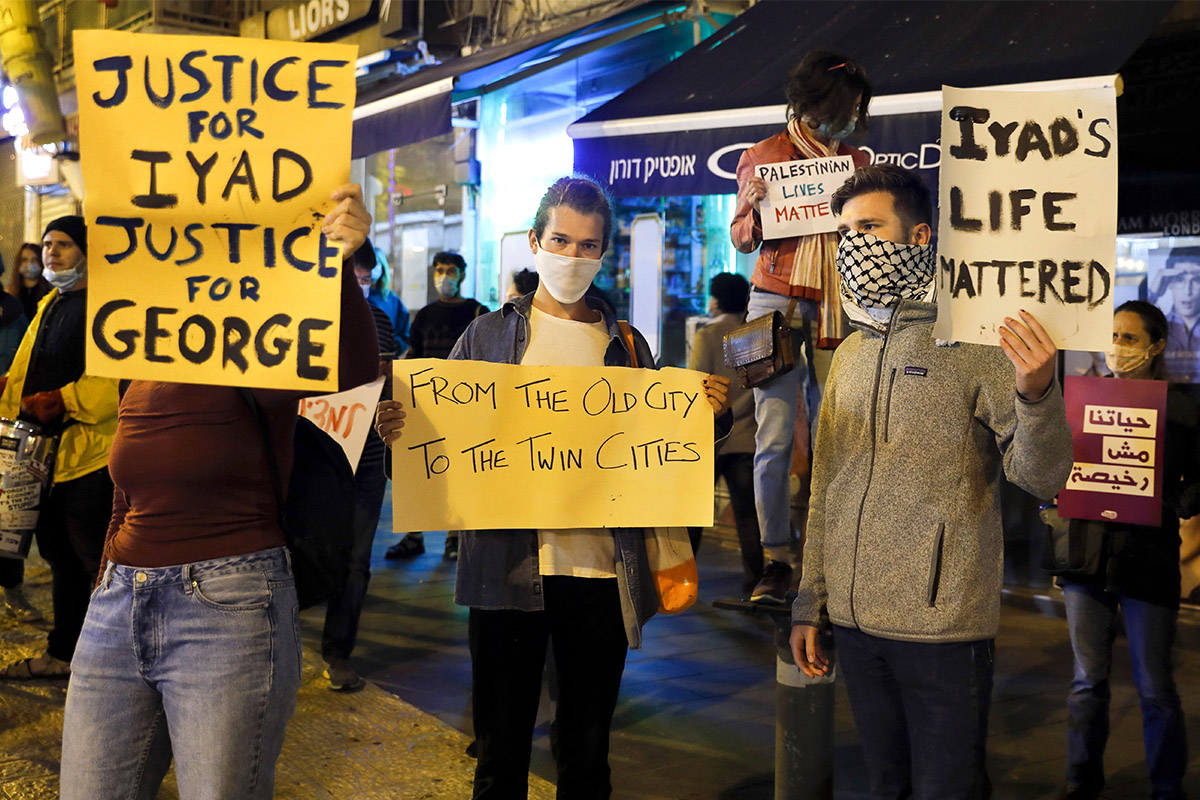Police and hundreds of protestors clashed the evening of Tuesday, June 2 as Rivka Bronner looked on from a distance. The 14-year-old activist says she witnessed a police officer break her friend’s glasses and push others to the ground as protestors blocked train tracks. Four were arrested.
Bronner wasn’t in Minneapolis, New York, or Washington, D.C. She was in downtown Jerusalem, where more than 300 Israeli, Palestinian, and international activists came together to protest police brutality in response to the police killing of Iyad Halak, an unarmed 32-year-old Palestinian man with autism, last week in Jerusalem. The protest was also held in solidarity with the demonstrations occurring in the United States in response to George Floyd’s murder.
“The protests are meant to disturb the peace because we need to show Jerusalem and Israel that police brutality isn’t okay,” Bronner told me over the phone. “It’s obvious to me that this is all part of a bigger system, not just in the U.S. and Israel. How police work in the world is totally bonkers.”
Bronner is one of the organizers leading Youth in Solidarity, the teenage contingent of the left-wing activist group Free Jerusalem. While Free Jerusalem has been organizing in support of Palestinian rights for years, Youth in Solidarity was founded in September 2019 in response to a summer of increased policing and violence between residents and Israeli security forces in Isawiya, a Jerusalem neighborhood near the Hebrew University campus.
“As an Israeli, it’s important because these people live right next to me, and it’s not okay that I get basic rights and they don’t,” said Nina Kon, a 14-year-old student from Jerusalem. “I go to protests because I think the occupation in general and the police violence in East Jerusalem is an important cause, and I think it should be addressed.”
Bronner said she is motivated to be politically active because it’s her duty as a citizen.
“As an Israeli, I live in a society with more than one kind of person, and to completely ignore that and to only talk about Jewish and Israeli issues is ignorant,” Bronner said. “People being killed is not something I can just be like, ‘Eh, well, it happens.’ It does, but it’s not supposed to happen, and I’m going to fight with other people to stop it.”
The protests, as well as the teens’ personal activism through social media and personal conversations, has been met with an abundance of indifference and apathy, according to 19-year-old Inbar Vardi.
“Even though there have been some demonstrations here and some articles in some newspapers, it hasn’t been a big enough deal for most people,” Vardi said. “Iyad was Palestinian, so to a lot of people, that means he was from an enemy state that threatens the security of the state. He obviously wasn’t, but that’s their reasoning behind why the police shot him, and that makes a difference to a lot of people here. Israelis are very protective of Israel, and there are a lot of strong feelings of nationalism, and it’s hard for people to see beyond that.”
According to Vardi, Halak’s death was a manifestation of the racism and violence ingrained in Israeli society.
“[The police] are a body that is supposed to protect everyone and be for everyone,” Vardi said. “When that body is the one that is hurting and even murdering people, I think that’s the worst way in which we can see this violence and racism that is so deep inside our country and our government. It’s important to remember that Iyad’s murder may have been one horrible example of police brutality in Israel, but there are a lot of those, especially in Jerusalem. For a lot of people, their lives are constantly being afraid of police. It’s important to remember that it’s not just a one-time thing.”
In response to Halak’s death, Public Security Minister Amir Ohana told the Knesset, the Israeli parliament, that there would be no change in police open-fire protocol, but that police will revisit policies regarding people with disabilities, according to Haaretz. Ohana also urged protesters to remain peaceful, saying, “We don’t need to import Minneapolis.”
Prime Minister Benjamin Netanyahu has not commented on Halak’s death. However, on Sunday, Israel’s alternate prime minister Benny Gantz said he was sure that Halak’s death would be investigated “swiftly.”
“We are really sorry about the incident in which Iyad Halak was shot to death and we share in the family’s grief,” Gantz said at a security cabinet meeting.
Continuing to spread awareness about police brutality in Israel, including to American Jews, is a priority for Bronner.
“I want more American Jews to be aware of the situation,” Bronner said. “Not enough people know that someone died in Israel a few days ago from police brutality. If you support Black Lives Matter, you should support us, too.”
Header image by AHMAD GHARABLI/AFP via Getty Images



